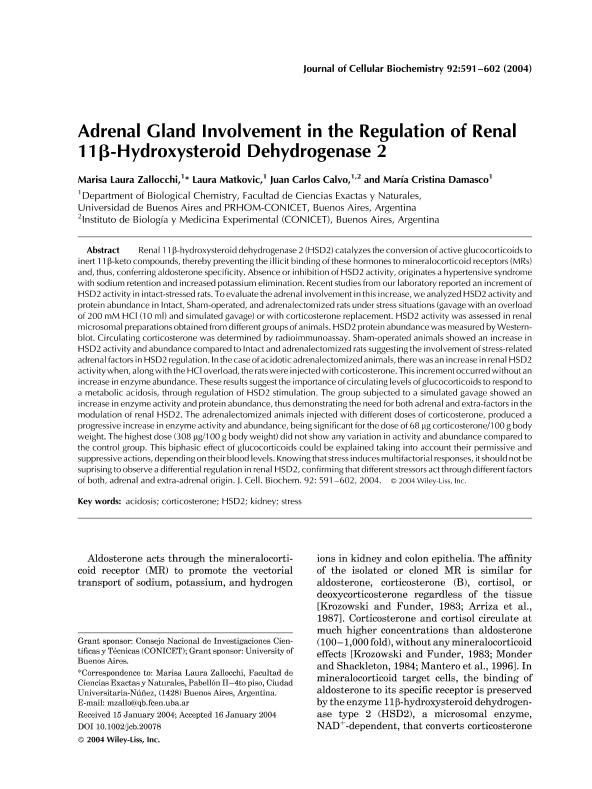Artículo
Adrenal gland involvement in the regulation of renal 11beta-hydroxysteroid dehydrogenase 2
Fecha de publicación:
06/2004
Editorial:
Wiley-liss, Inc
Revista:
Journal of Cellular Biochemistry
ISSN:
0730-2312
e-ISSN:
1097-4644
Idioma:
Inglés
Tipo de recurso:
Artículo publicado
Clasificación temática:
Resumen
Renal 11beta-hydroxysteroid dehydrogenase 2 (HSD2) catalyzes the conversion of active glucocorticoids to inert 11beta-keto compounds, thereby preventing the illicit binding of these hormones to mineralocorticoid receptors (MRs) and, thus, conferring aldosterone specificity. Absence or inhibition of HSD2 activity, originates a hypertensive syndrome with sodium retention and increased potassium elimination. Recent studies from our laboratory reported an increment of HSD2 activity in intact-stressed rats. To evaluate the adrenal involvement in this increase, we analyzed HSD2 activity and protein abundance in Intact, Sham-operated, and adrenalectomized rats under stress situations (gavage with an overload of 200 mM HCl (10 ml) and simulated gavage) or with corticosterone replacement. HSD2 activity was assessed in renal microsomal preparations obtained from different groups of animals. HSD2 protein abundance was measured by Western-blot. Circulating corticosterone was determined by radioimmunoassay. Sham-operated animals showed an increase in HSD2 activity and abundance compared to Intact and adrenalectomized rats suggesting the involvement of stress-related adrenal factors in HSD2 regulation. In the case of acidotic adrenalectomized animals, there was an increase in renal HSD2 activity when, along with the HCl overload, the rats were injected with corticosterone. This increment occurred without an increase in enzyme abundance. These results suggest the importance of circulating levels of glucocorticoids to respond to a metabolic acidosis, through regulation of HSD2 stimulation. The group subjected to a simulated gavage showed an increase in enzyme activity and protein abundance, thus demonstrating the need for both adrenal and extra-factors in the modulation of renal HSD2. The adrenalectomized animals injected with different doses of corticosterone, produced a progressive increase in enzyme activity and abundance, being significant for the dose of 68 microg corticosterone/100 g body weight. The highest dose (308 microg/100 g body weight) did not show any variation in activity and abundance compared to the control group. This biphasic effect of glucocorticoids could be explained taking into account their permissive and suppressive actions, depending on their blood levels. Knowing that stress induces multifactorial responses, it should not be surprising to observe a differential regulation in renal HSD2, confirming that different stressors act through different factors of both, adrenal and extra-adrenal origin.
Archivos asociados
Licencia
Identificadores
Colecciones
Articulos(IBYME)
Articulos de INST.DE BIOLOGIA Y MEDICINA EXPERIMENTAL (I)
Articulos de INST.DE BIOLOGIA Y MEDICINA EXPERIMENTAL (I)
Articulos(OCA CIUDAD UNIVERSITARIA)
Articulos de OFICINA DE COORDINACION ADMINISTRATIVA CIUDAD UNIVERSITARIA
Articulos de OFICINA DE COORDINACION ADMINISTRATIVA CIUDAD UNIVERSITARIA
Citación
Zallocchi, Marisa Laura; Matkovic, Laura Beatriz; Calvo, Juan Carlos; Damasco, Maria Cristina; Adrenal gland involvement in the regulation of renal 11beta-hydroxysteroid dehydrogenase 2; Wiley-liss, Inc; Journal of Cellular Biochemistry; 92; 3; 6-2004; 591-602
Compartir
Altmétricas




